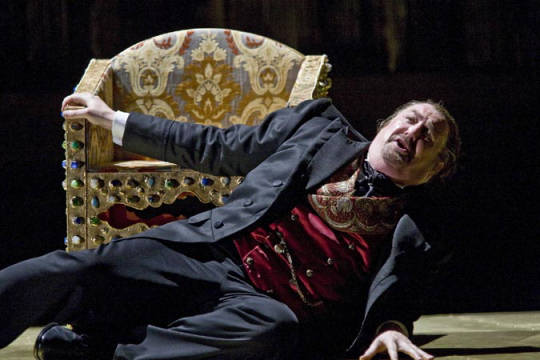Other Links
Editorial Board
- Editor - Bill Kenny
Founder - Len Mullenger
Google Site Search
SEEN
AND HEARD OPERA REVIEW
Mussorgsky, Boris Godunov:
Soloists, Orchestra and Chorus of the English National Opera,
English National Opera, London 10.11.2008 (AO)
Cast:
Boris Godunov – Peter Rose
Prince Shuisky –John Graham-Hall
Pimen- Brindley Sherratt
Grigory, the false Dimitri – Gregory Turay
Innkeeper – Yvonne Howard
Varlaam – Anton Rich
Missail – Anton Rich
Xenia – Sophie Bevan
Fyodor – Anna Grevelius
The Simpleton – Robert Murray
Production:
Tim Albery (director)
Tobias Hoheisel (sets)
Brigitte Reiffenstuel (costumes)
Peter Rose as Boris
This isn’t the “usual” Boris Godunov we know and love, but
the 1869 original. It may be “pure” Mussorgsky, but the composer and
Rimsky-Korsakov had good reasons for revising it: no Polish scenes,
no Princess Marina, no Kromy Forest. Nonetheless, this is much more
than a curiosity because it highlights the fundamentals of the plot,
rather than letting us luxuriate in highly–coloured histrionics.
The Chorus of the English National Opera (Martin Merry)
Edward Gardner (conductor)

Strangely enough, it feels closer to the spirit of Russia. Tim
Albery makes the implicit connection between medieval and modern.
Russia in “The Time of Troubles”, even for the wealthy, was more
spartan than the colourful images we see in books and paintings.
That’s why the Tsars and the Church were able to overwhelm the
peasants. Their authority was built on being able to dazzle the
serfs into submission. No wonder the peasants are terrified that
somehow the world will collapse if they aren’t dominated by a Tsar.
Of course their piety is enforced by police brutality, but the
confluence of credulity and servitude tells us something about
totalitarian regimes. If people want to believe, they’ll believe
anything. This is why False Dimitris figure so much in Russian
history. An old man claims his blindness is cured by visiting the
grave of the murdered Tsarevich. The dead child becomes a saint and
thus connects to the power of the Church. It isn’t rational, but it
scares the wits out of Boris. So much for his hold on power. No
wonder he has to die.
That’s why this production works so well. It’s firmly centred in the
barren greyness in which peasants live. The opening scene, with its
huge, oppressive beams hanging over the crowds, is claustrophobic, a
symbol of their oppression. The new Tsar walks past, in an elevated
cubicle, as distant from his subjects as a dream. Yet the masses
acclaim him as though he were a god. It’s no wonder communism had
such hold for so long, and the Rimsky-Korsakov version was preferred
by the authorities.
This version reveals the significance of the cell scene. The monk
Pimen may not be as attractive theatrically as a diva with a
stunning aria but he is the witness of time. Pimen may be frail, but
Boris realizes that he cannot escape the uncompromising judgement of
history. Brindley Sherratt doesn’t sound old, but he portrayed the
true nature of the role all the better by quietly forceful
delivery. Sherratt’s dignity is such that it also brings out the
irony in the Inn scene, where the drunken monks carouse. Varlaam
(Jonathan Viera) is more than comic relief. He represents the ugly
reality behind the surface glamour of the Church/State power
structure. That’s why False Dimitris are so dangerous. Gregory
Turay as Grigory seems a beacon of hope in contrast. It’s
interesting that Albery places the one truly vivid blaze of colour
with the Innkeeper. Yvonne Howard’s costume (designed by Brigitte
Reiffenstuel) is a visual riot, a flash of uninhibited vivacity.
This is costume making a statement: the peasants may be oppressed
but their folk culture is irrepressibly vigorous. Despite their
wealth, the robes of the Royal household are more muted and formal.
It’s a telling insight which can be obscured in more conventional,
opulent productions.
The central role, however, is Boris Gudonov himself. He’s
power-crazed enough to have murdered a child, yet years later is
consumed by remorse. Psychologically this is shocking stuff, and
many of the great Gudonovs of the past have played the intensity to
extremes. Perhaps Albery wants to bring out a more civilised, human
side in the role which is certainly valid. The tenderness Boris
feels for his children contrasts with the murder of the Tsarevich.
But it would have been impossible for Mussorgsky or Rimsky-Korsakov
not to show the Tsar in sympathetic terms. They’d have been murdered
or exiled themselves. This creates an emotional minefield. It’s
such a complex part that playing up the extremes is a perhaps a
relatively easy option. This is Peter Rose’s first Gudonov, so he
may grow into the part and explore its depths. On the other hand, it
fits nicely with Edward’s Gardner’s conducting, which underplays
excess where more intensity, too, would have enhanced the raw power
in Albery’s vision. Another advantage is that this Boris doesn’t
overwhelm the other parts. Prince Shuisky, in particular, is given
more weight. He wasn’t just the stock villain of legend. John
Graham-Hall’s strong, unfussy portrayal shows that it’s Shuisky’s
tragedy too, for Russian audiences know what happens to him after
the story in the opera ends. As for the ending of this production,
that’s a puzzle. Despite the funeral bells in the music, Albery has
Boris walk off after he dies. This can’t be accidental. Although I
don’t understand, it’s a tantalising mystery that makes you ponder
long after the evening ends.
Anne Ozorio
Picture © Clive Barda
Back
to Top
Cumulative Index Page
